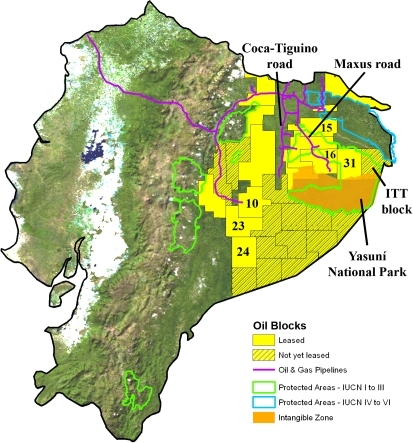The Conference of Parties (COP20) currently being held in Lima is critically important for South American countries given their exposure to climate change impacts. Land surface changes, fossil fuel extraction, and sea level rise are key concerns for these countries.
Changes to pristine lands
 This post is part of a series on the UN Climate Change Conference in Lima (COP 20).
This post is part of a series on the UN Climate Change Conference in Lima (COP 20).
I used to take exotic trips when I was a small boy in my native country of Ecuador. Sometimes we went to the top of the Andes, sometimes to the jungle, sometimes to the mangrove islands. I remember the lush forests along the roads, interminable green. Our boat ride to my grandfather’s hacienda meandered through thick mangroves that felt like caves.
When I visited some of these sites years later I saw only humanity’s footprint. Mangroves gave way to shrimp farms. The jungle, once grand in scale, had given way to farms and shrubs. The Andean mountain tops, so starkly white in my childhood, were grayer.
The cost of fossil fuel extraction
Ecuador is part of the Organization of the Petroleum Exporting Countries (OPEC), with oil reserves in the country’s eastern rain forest, part of the Amazon basin. It has the third largest oil reserves in South America, behind Venezuela and Brazil.
The government of Ecuador has been quite clear about its intentions as far as fossil fuel extraction. In the wake of being unable to secure $3.6 billion to leave oil in the Amazon Basin, Ecuador officials decided to move on with the extraction of heavy crude.

Oil blocks in Ecuador’s Amazon. Image: Openl, PubMed Central http://openi.nlm.nih.gov/faq.php#copyright
An interesting precedent would have been set if the Yasuni ITT payment had gone through: Would payments be made to other large oil-producing countries to keep fossil fuels in the ground?
Ecuador’s decision has come at great cost to Yasuni National Park, one of the most biodiverse places on earth, and to the natives in the region. But it has also riled up local and international activists and represents important subject matter for COP20 talks.
Ways forward for South America
Increased knowledge and respect of the environment is a growing sentiment for many in Ecuador. This was evident with the Yasuni case. It is also evident in the reduction in deforestation in Brazil.
It is unfortunate that the deforestation rate has slowed in pace mostly in Brazil. Yet advocacy in countries such as Ecuador is a growing trend. Hopefully, the message from the population will be loud enough to hear in Lima.
